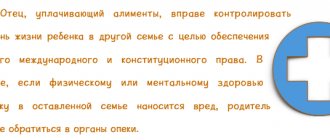Home » Alimony » Maximum percentage of alimony from salary
5
Children have the right to receive child support from a separated parent. The amount of monthly payments is regulated by the Family Code of the Russian Federation. The child is paid either a percentage of the parent’s income, or a certain fixed amount if the payer’s financial situation is unstable.
The alimony provider seeks to reduce the real amount of income, and the recipient seeks to defend the right to receive the required funds to maintain a decent standard of living for minors. The amount of security may vary depending on the circumstances: the need to support an ex-wife, unprofitable work, an increase in income, entering into a new family relationship.
Main criteria on this issue
The maximum amount of alimony directly depends on several methods of calculation:
- There is no limit to the maximum amount of alimony based on an agreement between the parties. This is explained by the fact that this method implies the ability of one party to pay alimony to the other in any amount. The main thing is that the rights of the person making alimony payments from the salary are not infringed;
- with the shared method of accrual, a standard scheme is used, in which, if there are more than 3 children, the court has the right to recover a certain percentage of the salary (about 50% of total earnings). Although it is possible that the amount of alimony may be increased if certain circumstances and factors exist;
- if payment is made in a fixed amount of money, then in this case there are also no restrictions. When the amount of alimony is determined in this way, it is based on the maximum amount allowed for the full maintenance of children.
The maximum amount for alimony is a concept that depends on certain circumstances. The law sets the maximum amount that can be recovered - 70 percent of income.
What to do if the alimony payer does not work
Some fathers think that they can save on payments if they don’t get a job at all, receive a salary “in an envelope,” or hide their earnings. This is a completely wrong position.
Every man cares what percentage of his salary goes to alimony. But! We should not forget that no matter how bad the relationship you have with your ex-wife, you are not paying money to her, but to your son or daughter, who is not ex-wife. And leaving them without maintenance is unworthy for a man.
In addition, the bailiff will collect money from you every month, even if you are not working. And the size of these payments will be calculated from the average earnings in Russia, which is about 30,000 rubles. It is clear that such an amount cannot be earned in every locality. You will simply accumulate debt, which you will still have to pay off if you get a job. Therefore, in terms of paying for children, it is much more profitable to have at least a low-paying job than not to work at all. Malicious evasion of alimony payments is generally a crime, but there are also legal ways not to pay alimony.
It often happens that during a divorce, the child remains with the mother, who collects alimony. But later the mother stops raising and supporting the child, so the father takes him for himself. In this case, payments may not just be reduced, but withdrawn altogether. Moreover, the father now has the right to collect alimony from the negligent mother.
Family disputes are generally very difficult due to accumulated grievances between adults. However, mothers and fathers should not forget that children are not bargaining chips or an instrument of revenge on their ex-spouse. And the fate of your children depends on how much you can abstract from old grievances and maintain adequate relationships for the sake of the interests of the future generation.
Therefore, the simplest and most worthy way to solve the alimony problem is to come to an amicable agreement. If you voluntarily help your ex-family, then most likely it will not come to court.
Save
Save
Save
Nuances on the amount of alimony
Any question implies the presence of certain features that can have a significant impact on the amount of alimony:
- maintenance for 1 child. When collecting on the basis of a court decision, the percentage calculation is based on ¼ of the debtor’s total income;
- provision of 2 minors. If the alimony payer has 2 children, then the maximum amount of alimony payments will be 1/3 of earnings;
- three or more children. Under such circumstances, the court may recover from the main payer 1/6 of the salary for each child separately or up to 50% of the total salary;
- alimony for wife. Here the situation is more delicate. The RF IC has Article 90, which regulates the procedure for compulsory maintenance of a spouse. This amount of alimony can be set either as a percentage or as a “flat amount”. The maximum rate is usually determined either through legal proceedings or on the basis of an agreement between the parties, officially certified by a notary;
- alimony to parents. Alimony payments of this kind are a legal obligation of adult children, regulated by Article 87 of the RF IC, and concern the provision of disabled parents. Here, the maximum amounts are determined in the same way as the calculation of alimony for a spouse.
From what income is alimony withheld?
When calculating, all sources of income of the payer are taken into account.
Working two jobs, receiving allowances and bonuses, the parent must understand that part of the funds received will be used for the development and education of the descendant. In July 1996, Law No. 841 was adopted, which describes in detail all types of income that must be taken into account when determining the amount of alimony. This includes:
- salary taking into account bonuses, allowances, additional payments, overtime, incentives for working on weekends, vacation pay and other additional payments;
- compensation for damage to health;
- scholarships;
- net profit received as a result of business activities;
- pension payments;
- funds from the rental of real estate;
- the income of people arriving in places of detention, calculated as their salary minus the funds spent by the correctional institution on maintenance.
The Tax Code of the Russian Federation provides for tax deductions for which personal income tax is not calculated.
For the first and second children, the deduction is 1,400 rubles each, for the 3rd and 4th – 3,000 rubles each. Tax deductions do not apply to wages exceeding 350 thousand rubles. If the amount of security does not exceed 50% of income and is excessively high, the amount of monthly payments is reviewed in court.
Important settlement terms
The procedure and calculation scheme has some conditions that have a direct impact on the final amount of alimony:
- financial situation and the possibility of full security are important conditions when drawing up an agreement with a notary;
- During legal proceedings, the establishment of the maximum amount of alimony may be influenced by conditions related to:
- facts confirming the relationship;
- children living with the plaintiff or defendant;
- the presence of children from other marriages;
- official salary;
- systematic facts of failure to fulfill parental obligations, etc.
- The court, after analyzing all the factors and conditions, can make a decision according to which the amount of payments will be:
- about 50% - if there are 3 or more children. It can be increased if there is a disabled child in the family (up to 70% of the total official income);
- up to 70% – if there is an agreement on fixed payments and an agreement with the plaintiff.
Levers of legislative regulation
Alimony payments and all the subtleties associated with such cases have a legislative basis. With its help you install:
- the amount of alimony through the use of a voluntary agreement between parents or a compulsory collection. Regulated by articles 81,83,103 of the IC of Russia;
- procedure for collecting funds according to sources of income. Regulated by Decree No. 841 of the Government of the Russian Federation;
- the main subtleties of the procedure related to the collection of alimony, debts, tax deductions for alimony payments. Described in the Federal Law “On Enforcement Proceedings”.
Cases of reductions in the maximum amount of alimony payments
As for the maximum size, it can be revised downwards. This process is regulated by applying Article 119 of the RF IC. To ensure a review, the alimony payer must have grounds, which may include:
- receipt of official disability of 1 or 2 groups with subsequent significant costs for appropriate treatment (opinion of specialists);
- the beginning of the working activity of a child receiving alimony benefits (including entrepreneurial activity);
- children have property that generates systematic income;
- confirmation of the fact that the payer has other dependents in need of maintenance;
- additional child support for children from other families;
- the alimony payer receives a large salary, and ¼ of it exceeds the support standards that are necessary for the full maintenance of children;
- the fact of the child’s official transfer to state support.
The correct downward transfer of alimony payments must be accompanied by either the conclusion of a new agreement or the filing of a claim with the courts.
Some of the most relevant factors for reducing the amount of payments are:
- independent income of the child/children. This fact requires reasonable evidence. A child can receive such income both through independent work (including entrepreneurial activity) and through passive income;
- the alimony payer is unemployed. If there is a fact that the defendant does not have a job, the judicial authorities can reduce the amount to the minimum amount for child support, but only if the alimony payer has good reasons for this:
- dismissal from the organization due to staff reduction;
- dismissal during enterprise reorganization, etc.
If the debtor is registered as unemployed with social services, then alimony will be collected from the benefit. If it is revealed that evasion of alimony payments by deliberate refusal to work is detected, criminal liability measures will be applied to the payer;
- Family status. Certain family circumstances of the payer, considered in court, may affect the reduction in the amount of maximum alimony:
- presence of another family and minor children;
- disabled parents are fully supported by the alimony payer.
Even if payments are revised, their deduction procedure must remain the same in accordance with the standards established by law. If this was an independent decision of the defendant, then on the basis of his statement at the place of work. In other cases, this is a court decision, a writ of execution, or a voluntary agreement with specified retention nuances. Any discrepancies and inconsistencies require a re-application to the court or an agreement between the parties.
The maximum amount of money that can be collected for child support is established by law. If they disagree with the due payments, the mother or father can go to court to resolve the dispute.
Conditions affecting the purpose of payment
Attention!
The articles describe typical ways to resolve legal issues, but each case is unique. If you want to find out how to solve your particular problem - and get a free consultation: or call the hotline right now:8 For regions of Russia
8 Moscow and Moscow region.
8 St. Petersburg and Leningrad region.
It's fast and free!
Due to the fact that the maximum is not defined by law, the best way to determine alimony amounts is considered to be a settlement agreement.
It allows parents to agree on the most acceptable conditions that do not prejudice the parties. If the issue is considered by the court, then not only the evidence of the parties, but also other factors are taken into account. Including:
- living wage (LM);
- minimum wage (minimum wage).
Important!
If it is impossible to determine the amount of the defendant’s income, then alimony is assigned in a fixed amount. Moreover, their level is calculated from the minimum wage indicator. Thus, the recipient receives rather insignificant money. For example, in 2021 the minimum wage is 7,500 rubles. For one minor it turns out: 7,500 rubles. / 4 = 1875 rub. This is in no way similar to the maximum amount.
Advice. If the alimony holder is a malicious evader, then evidence of his income should be collected. The court may apply other measures of influence to such a person, including criminal prosecution.







